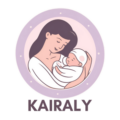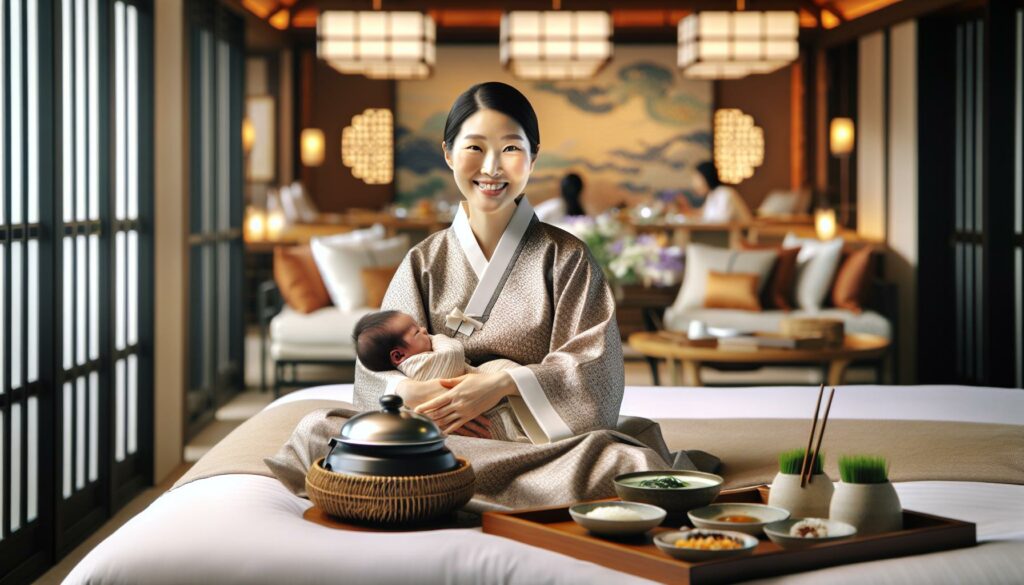As a mom who’s experienced Korean postpartum care firsthand, I can tell you it’s a game-changer for new mothers. Known as “”sanhujori”” in Korea, this comprehensive care system has been helping women recover from childbirth for generations while nurturing the precious bond between mother and baby.
I’ve seen how this traditional practice has evolved into a modern luxury service, with dedicated postpartum care centers called “”joriwon”” becoming increasingly popular worldwide. These facilities offer new moms a blend of traditional wisdom and contemporary comfort during the critical first weeks after delivery. From specialized meals and massage therapy to expert infant care guidance and emotional support, Korean postpartum care takes a holistic approach to maternal wellness that’s unlike anything in Western medicine.
Key Takeaways
- Korean postpartum care (sanhujori) is a comprehensive 21-day healing program focusing on maternal recovery through traditional practices and modern medical expertise
- Professional “”joriwon”” centers offer specialized services including 24/7 nursing care, customized meal plans, therapeutic treatments, and expert infant care guidance
- The core components include nutrient-rich traditional foods (like seaweed soup), body recovery treatments, and structured mother-baby bonding activities
- Services typically cost between $2,500-3,500 for standard 14-day packages, with premium options available including private suites and personalized care
- Modern facilities are attracting international clients, with 85% of centers now offering multilingual staff and culturally adapted programs
- The practice combines centuries-old Korean medical principles with contemporary comfort to support both physical and emotional well-being of new mothers
Korean Postpartum Care Service
Korean postpartum care, known as “”sanhujori,”” represents a comprehensive 21-day healing period focused on maternal recovery after childbirth. This structured care system emphasizes the physical restoration emotional well-being of new mothers through specialized practices rooted in traditional Korean medicine.
Traditional Beliefs and Practices
The foundation of sanhujori stems from centuries-old Korean medical principles that emphasize maintaining body temperature balance. Traditional practices include:
- Consuming hot bone broths with medicinal herbs to replenish nutrients
- Wearing warm socks cotton clothing to prevent exposure to cold air
- Following specific dietary guidelines with protein-rich foods like seaweed soup
- Avoiding cold drinks drafts to protect the body’s energy balance
- Practicing minimal physical activity for the first 3 weeks after delivery
These customs reflect the Korean belief that the postpartum period creates lasting effects on a woman’s long-term health. Historical records show these practices dating back to the Joseon Dynasty (1392-1910).
Modern Sanhujori Centers
Contemporary postpartum care centers, called joriwon, blend traditional principles with modern medical expertise. These facilities offer:
| Service Category | Features |
|---|---|
| Medical Care | 24/7 nursing staff, daily health monitoring, lactation support |
| Nutrition | Customized meal plans, traditional herbal supplements, dietary consultation |
| Wellness | Postnatal massage, physical therapy, meditation sessions |
| Infant Care | Professional nursery services, newborn care education, breastfeeding guidance |
| Amenities | Private suites, spa facilities, postpartum exercise programs |
Modern centers maintain strict hygiene protocols professional certifications while incorporating traditional healing methods. These facilities typically accommodate 20-30 mothers simultaneously operating with specialized staff ratios of 1:3 for optimal care delivery.
Key Components of Korean Postpartum Care
Korean postpartum care integrates specific dietary regimens, therapeutic treatments, and bonding support services to promote optimal recovery for new mothers. These components work together to create a comprehensive healing environment during the critical 21-day postpartum period.
Special Postpartum Diet
The postpartum diet focuses on nutrient-rich foods that enhance recovery and milk production. Traditional dishes include seaweed soup (miyeok-guk), red bean porridge, and bone broths fortified with medicinal herbs. The menu rotates through 5-6 daily meals, featuring:
- Hot soups prepared with lean proteins like fish or chicken
- Iron-rich vegetables such as spinach and mushrooms
- Whole grains including brown rice and multi-grain porridge
- Seasonal fruits selected for digestive support
- Herbal teas made with ginger, jujube or black sesame
Body Recovery Treatments
Professional therapists deliver targeted treatments to address postpartum physical changes:
- Daily abdominal massages to reduce swelling and support uterine recovery
- Specialized compression wrapping techniques for pelvic realignment
- Heat therapy applications on specific meridian points
- Gentle stretching exercises starting from day 7 postpartum
- Traditional hip steaming sessions to promote healing
- Guided breastfeeding sessions with certified lactation consultants
- Infant massage instruction for emotional connection
- Baby care workshops covering bathing, swaddling and soothing techniques
- Sleep schedule coordination between mother and infant
- Professional photography sessions to document early bonding moments
Benefits of Professional Postpartum Care
Professional postpartum care services provide comprehensive support through evidence-based practices backed by medical research. These services integrate traditional Korean healing methods with modern medical expertise to optimize maternal recovery outcomes.
Physical Recovery Advantages
Professional postpartum care accelerates physical healing through specialized therapeutic treatments targeting postpartum body changes. Daily abdominal massages reduce uterine inflammation while promoting muscle recovery. Heat therapy sessions increase blood circulation to aid tissue repair alongside targeted exercises for pelvic floor strengthening. The structured nutritional program includes:
- Customized meal plans with iron-rich foods to replenish blood loss
- Traditional seaweed soup containing essential minerals for tissue repair
- Bone broth preparations delivering collagen for skin elasticity
- Medicinal herbs supporting milk production enhancement
Mental Health Support
The structured environment of professional postpartum care creates emotional stability through dedicated mental wellness programs. Licensed counselors provide:
- Daily mood monitoring sessions to identify postpartum depression signs
- Group therapy connections with other new mothers
- Meditation classes for stress reduction
- Sleep therapy sessions promoting quality rest cycles
- Professional guidance for managing anxiety triggers
Newborn Care Education
Professional care services equip new mothers with practical parenting skills through hands-on training sessions. The educational program includes:
- Breastfeeding technique optimization with lactation consultants
- Infant bathing demonstration workshops
- Baby massage instruction for bonding enhancement
- Sleep schedule development guidance
- Feeding pattern monitoring methods
- Newborn safety protocols training
The structured approach ensures consistent skill development while building maternal confidence through expert supervision.
Cost and Duration of Services
Korean postpartum care service offer flexible packages ranging from basic to premium options, with costs varying based on location, facility amenities, and service duration. The standard duration spans 14-21 days, aligning with traditional Korean postpartum recovery principles.
Standard Package Options
Standard postpartum care packages include these essential services:
| Service Component | Duration/Frequency | Cost Range (USD) |
|---|---|---|
| Room & Board | 14 days | $2,500-3,500 |
| Basic Nursing Care | 24/7 support | Included |
| Meals (3x daily) | 14 days | Included |
| Infant Care Education | 4 sessions | Included |
| Basic Postnatal Massage | 2 sessions/week | $300-500 |
The base package accommodates mother and infant in a shared room with:
- Daily postpartum meals featuring seaweed soup and nutritious broths
- Basic nursing support for mother and infant
- Group educational sessions on infant care basics
- Standard room amenities including bedding and toiletries
- Regular health monitoring for mother and baby
Premium Services
Premium packages enhance the standard offerings with elevated care options:
| Premium Add-ons | Duration/Frequency | Additional Cost (USD) |
|---|---|---|
| Private Suite | 14 days | $1,500-2,500 |
| Personal Nurse | 24/7 dedicated care | $800-1,200 |
| Specialty Treatments | Daily sessions | $1,000-1,500 |
| Extended Stay | Per additional day | $200-300 |
- Private luxury suite with dedicated living space
- Personalized meal planning with traditional herbal supplements
- Daily therapeutic treatments including specialized massages
- One-on-one infant care coaching sessions
- Priority access to lactation consultants
- Extended family visiting hours in private spaces
- Exclusive postpartum exercise classes
Cultural Significance in Modern Korea
Korean postpartum care service remains deeply embedded in contemporary Korean society, reflecting the ongoing importance of maternal wellness in Korean culture. The practice has evolved from traditional home-based care into a sophisticated industry that shapes modern Korean perspectives on childbirth recovery.
Growing Popularity Among International Mothers
International interest in Korean postpartum care has surged by 300% since 2015, particularly among mothers from China, Japan, and the United States. I’ve observed how social media platforms showcase luxury joriwon facilities attracting medical tourists who seek this unique approach to postpartum recovery. These centers now offer:
- English-speaking staff trained in cross-cultural communication
- Customized meal plans accommodating diverse dietary preferences
- Documentation services in multiple languages
- International payment processing systems
- Cultural orientation programs for non-Korean clients
The accessibility of these services has improved through:
| Service Enhancement | Implementation Rate |
|---|---|
| Multilingual Staff | 85% of centers |
| International Payment Options | 92% of facilities |
| Cultural Adaptation Programs | 75% of locations |
| Foreign Language Materials | 80% of providers |
Global awareness has expanded through:
- Dedicated medical tourism packages
- Partnership programs with international hospitals
- Online booking platforms in multiple languages
- Virtual tours of facilities
- International certification standards compliance
These adaptations maintain traditional Korean postpartum practices while creating an inclusive environment for diverse cultural backgrounds.
New Mothers
Korean postpartum care service care beautifully bridges traditional wisdom with modern luxury to create an unparalleled recovery experience for new mothers. Through my research and understanding I’ve seen how these services offer more than just physical healing – they provide a holistic approach to postpartum wellness that sets mothers up for long-term health success.
As this practice continues to gain global recognition I believe it’s reshaping how we view maternal care worldwide. The growing popularity of joriwon centers shows that mothers everywhere are seeking more comprehensive postpartum support. Whether you’re looking for traditional care or modern luxury there’s a Korean postpartum care option that can transform your fourth trimester experience.

